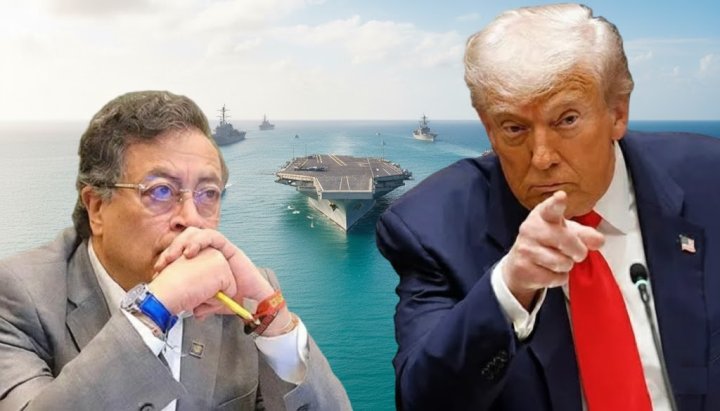Politics
U.S. Intensifies Pressure on Colombia Amid Drug Policy Controversy

The United States is ramping up its diplomatic and military engagement in Latin America, particularly targeting Colombia, amid a controversial approach to drug trafficking and regional security. This shift under the Trump administration reflects a historical pattern of intervention, reminiscent of the Monroe Doctrine, which prioritized U.S. interests in the region.
The U.S. government has resumed military operations in the Southern Caribbean, alleging a need for “maritime interdiction” against drug trafficking. Critics argue that these actions primarily serve as a military provocation against Venezuela and undermine the sovereignty of several nations in the region. According to reports, the U.S. military presence has escalated tensions, exemplified by recent incidents involving civilian boats and aggressive maneuvers off the coast of Venezuela.
Colombian President Gustavo Petro has openly condemned the U.S. military’s operations. He stated, “We do not want warships in our seas, nor foreign armies patrolling our coasts under the guise of cooperation.” This statement has drawn criticism from both U.S. officials and right-wing factions within Colombia, leading to retaliatory measures from the Trump administration, including the withdrawal of Petro’s visa and threats of economic sanctions.
The U.S. has accused Petro of “tolerating” drug trafficking, framing it as part of a broader strategy of diplomatic pressure. This tactic, often described as blackmail diplomacy, aims to undermine any government that challenges U.S. influence or asserts its sovereignty. The implications of such actions are profound, particularly for a country like Colombia, which has struggled with the ramifications of drug trade and foreign intervention.
Despite the complexities of Petro’s government, which maintains capitalist policies and collaborates with Colombian elites, the focus here is on the broader context of U.S. imperialism. The Trump administration’s rhetoric about “restoring U.S. leadership in the hemisphere” has been met with skepticism, as it often coincides with intensified sanctions and military posturing against nations like Venezuela, which has been severely impacted by U.S. sanctions.
Historically, the U.S. has utilized the “war on drugs” as a pretext for military interventions, ensuring its military presence in strategic locations. The Southern Caribbean is once again becoming a focal point for these operations, which are perceived as efforts to secure American interests rather than genuinely combat drug trafficking.
As tensions rise, the need for a unified response from Latin American nations grows more urgent. The Trotskyist Fraction and Left Voice have called for a collective rejection of U.S. military presence in the region. They urge workers, students, and civil organizations to mobilize against foreign intervention and to oppose sanctions that hinder true sovereignty.
The current situation underscores the intricate balance of power in Latin America, where the legacy of colonialism and the weight of U.S. influence continue to shape political realities. The call for an independent policy, free from imperialist dictates, resonates strongly among those seeking genuine autonomy and social justice across the continent.
-

 Lifestyle1 week ago
Lifestyle1 week agoSend Holiday Parcels for £1.99 with New Comparison Service
-

 Science2 months ago
Science2 months agoUniversity of Hawaiʻi Leads $25M AI Project to Monitor Natural Disasters
-

 Science2 months ago
Science2 months agoInterstellar Object 3I/ATLAS Emits Unique Metal Alloy, Says Scientist
-

 Science2 months ago
Science2 months agoResearchers Achieve Fastest Genome Sequencing in Under Four Hours
-

 Business2 months ago
Business2 months agoIconic Sand Dollar Social Club Listed for $3 Million in Folly Beach
-

 Politics2 months ago
Politics2 months agoAfghan Refugee Detained by ICE After Asylum Hearing in New York
-

 Business2 months ago
Business2 months agoMcEwen Inc. Secures Tartan Lake Gold Mine Through Acquisition
-

 Health2 months ago
Health2 months agoPeptilogics Secures $78 Million to Combat Prosthetic Joint Infections
-

 Lifestyle2 months ago
Lifestyle2 months agoJump for Good: San Clemente Pier Fundraiser Allows Legal Leaps
-

 Science2 months ago
Science2 months agoMars Observed: Detailed Imaging Reveals Dust Avalanche Dynamics
-

 Health2 months ago
Health2 months agoResearcher Uncovers Zika Virus Pathway to Placenta Using Nanotubes
-

 Entertainment2 months ago
Entertainment2 months agoJennifer Lopez Addresses A-Rod Split in Candid Interview








